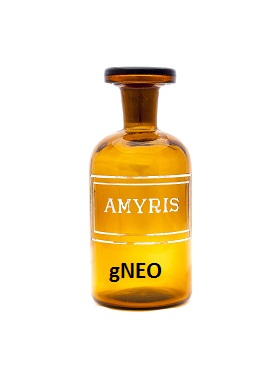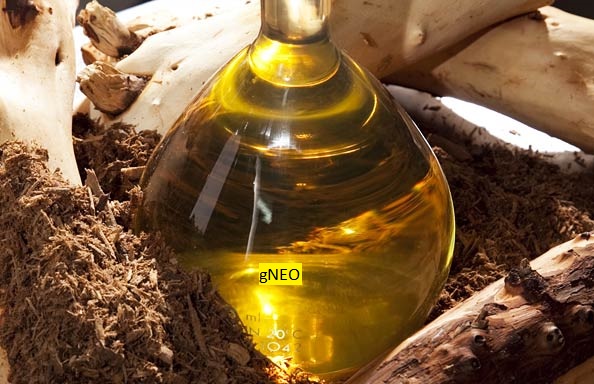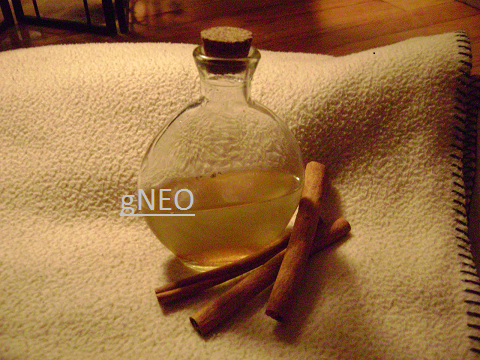Description: Patchouli dark essential oil is one of the most active and is a good tissue re-generator, which helps to stimulate the growth of new skin cells. It is found to be very effective in healing rough, cracked and overly dehydrated skin and is used to treat acne, eczema, sores, ulcers, fungal infections, as well as scalp disorders. When the patchouli is distilled using iron vats, the end product is called “dark”; when it is distilled using stainless steel vats, the end product is called “light”. This is because, when using iron vats, metallic ions are released in to the oil which darken the color. Patchouli light has a lighter aroma, color and is known to fade more quickly.
Patchouli essential oil became very popular during the “hippie generation” of the sixties and was used as an incense or natural perfume. There are those who believe patchouli essential oil to be overpowering and unpleasant. However, if used correctly and sourced from a reputable manufacturer, it can be quite subtle and more grounding. Patchouli essential oil may be the only essential oil that improves with age, with the aroma becoming deeper, smoother and less pungent over time.
Patchouli essential oil can be a sedative at low doses and stimulating at higher doses, so the amount you include will determine the outcome of your blends. Therapeutically, it is known to possess antiseptic, astringent, antidepressant, carminative and anti-inflammatory properties. Use sparingly!
Botanical Name: Pogostemon Cablin
Plant Part: Leaves
Extraction Method: Steam distilled
Odor and Appearance: A yellow to dark yellow liquid with a typical, persistent and slightly camphoraceous odor.
Country of origin: Sri Lanka
Main Constituents: Dark patchouli essential oil, like other essential oils, is composed of various chemical compounds. The main constituent responsible for its characteristic aroma and therapeutic properties is patchouli alcohol, also known as pogostol. Patchouli oil may also contain other constituents such as alpha-patchoulene, beta-patchoulene, alpha-guaiene, and alpha-bulnesene, among others. These compounds contribute to the overall scent and potential therapeutic benefits of the oil.
Common Uses: Patchouli essential oil is derived from the leaves of the patchouli plant (Pogostemon cablin), which is native to tropical regions of Asia. It has a distinct, earthy, and woody aroma that is both grounding and soothing. Patchouli essential oil has been used for various purposes, including aromatherapy and traditional medicine. Here are some common uses and benefits of patchouli essential oil:
Aromatherapy: Patchouli oil is frequently used in aromatherapy for its calming and grounding properties. It can help reduce feelings of anxiety, stress, and depression. Inhaling the aroma can promote relaxation and a sense of well-being.
Skincare: Patchouli essential oil is known for its skin-healing properties. It can be used to soothe and treat a variety of skin conditions, including acne, eczema, and dry or irritated skin. It is often added to skincare products like lotions, creams, and soaps.
Anti-inflammatory: Patchouli oil has anti-inflammatory properties, which can be beneficial for reducing inflammation and swelling in the body. It may be applied topically (diluted with a carrier oil) to areas of discomfort or pain.
Aphrodisiac: Patchouli has a long history as an aphrodisiac. Its rich, exotic scent is believed to have a sensual and romantic quality, making it a popular choice for perfumes and massage oils.
Insect repellent: The strong and distinct scent of patchouli can act as a natural insect repellent. It can be used in diffusers or diluted with a carrier oil and applied to the skin to help keep insects at bay.
Hair care: Patchouli oil is sometimes added to hair care products such as shampoos and conditioners. It is believed to promote healthy hair and a balanced scalp, as well as add a pleasant fragrance.
Mood enhancer: In addition to its calming effects, patchouli oil is also known to be an uplifting scent. It can help boost mood and provide a sense of emotional balance.
Deodorant: Due to its pleasant aroma and potential antibacterial properties, patchouli essential oil can be used as a natural deodorant. It helps neutralize body odor and provides a lasting fragrance.
Stimulant: Some people use patchouli oil to stimulate circulation and promote overall wellness. When used in massages or baths, it may help alleviate feelings of fatigue and improve energy levels.
Spiritual and meditation practices: Patchouli is often used in meditation and spiritual practices for its grounding properties. It is believed to help connect the practitioner with the earth and promote a sense of inner peace and mindfulness.
Note: Patchouli essential oil is a base note in aromatherapy and perfumery.
Blend Well With: Lavender, Citrus oils, Rose, Sandalwood, Vetiver, Frankincense, Cedarwood, Ylang-Ylang, Ginger, Clove
Contraindications: Patchouli Essential Oil is considered safe to use. Just like many other essential oils, it is wise to use this oil after dilution with a carrier oil, as it can be sensitive and irritating to the skin. Before you use Patchouli Essential Oil on your skin, it is advisable that you conduct a patch test before making it a routine.
Do not use internally, unless directed by a physician. For pregnant women and nursing mothers, it is safe to consult first with your physician before using Patchouli Essential Oil. Do not use on broken skin or on abrasions.
*These statements have not been evaluated by the Food and Drug Administration. This product is not intended to diagnose, treat, cure, or prevent any disease.*
For large quantities please contact us via our phone number or through the Contact Us page.
Like us on Facebook.









Erika N. (verified owner) –
I have customers who only come to me for this earthy, deep and lovely aged Patchouli! The best I have smelled!
Tanja H. (verified owner) –
Bobbe Jo Robinson (verified owner) –
Smells wonderful
Amanda N. (verified owner) –
A very nice patchouli!
Roshan R. (verified owner) –
Excellent quality and price.
Jennifer R. (verified owner) –
This scent is a top seller for us with our goats milk soap.
Amanda N. (verified owner) –
A favorite patchouli. Holds up well in bar and liquid soap!
Gina A. (verified owner) –
Virginia Shriner (verified owner) –
good price